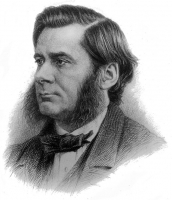| |
Thomas Henry Huxley PC FRS HonFRSE FLS (4 May 1825 – 29 June 1895) was an English biologist and anthropologist specialising in comparative anatomy. He is known as "Darwin's Bulldog" for his advocacy of Charles Darwin's theory of evolution.
The stories regarding Huxley's famous debate in 1860 with Samuel Wilberforce were a key moment in the wider acceptance of evolution and in his own career, although historians think that the surviving story of the debate is a later fabrication. Huxley had been planning to leave Oxford on the previous day, but, after an encounter with Robert Chambers, the author of Vestiges, he changed his mind and decided to join the debate. Wilberforce was coached by Richard Owen, against whom Huxley also debated about whether humans were closely related to apes.
Huxley was slow to accept some of Darwin's ideas, such as gradualism, and was undecided about natural selection, but despite this he was wholehearted in his public support of Darwin. Instrumental in developing scientific education in Britain, he fought against the more extreme versions of religious tradition.
Originally coining the term in 1869, Huxley elaborated on "agnosticism" in 1889 to frame the nature of claims in terms of what is knowable and what is not. Huxley states
Use of that term has continued to the present day (see Thomas Henry Huxley and agnosticism). Much of Huxley's agnosticism is influenced by Kantian views on human perception and the ability to rely on rational evidence rather than belief systems.
Huxley had little formal schooling and was virtually self-taught. He became perhaps the finest comparative anatomist of the later 19th century. He worked on invertebrates, clarifying relationships between groups previously little understood. Later, he worked on vertebrates, especially on the relationship between apes and humans. After comparing Archaeopteryx with Compsognathus, he concluded that birds evolved from small carnivorous dinosaurs, a theory widely accepted today.
The tendency has been for this fine anatomical work to be overshadowed by his energetic and controversial activity in favour of evolution, and by his extensive public work on scientific education, both of which had significant effects on society in Britain and elsewhere. Huxley's 1893 Romanes Lecture, “Evolution and Ethics” is exceedingly influential in China; the Chinese translation of Huxley's lecture even transformed the Chinese translation of Darwin's Origin of Species.
